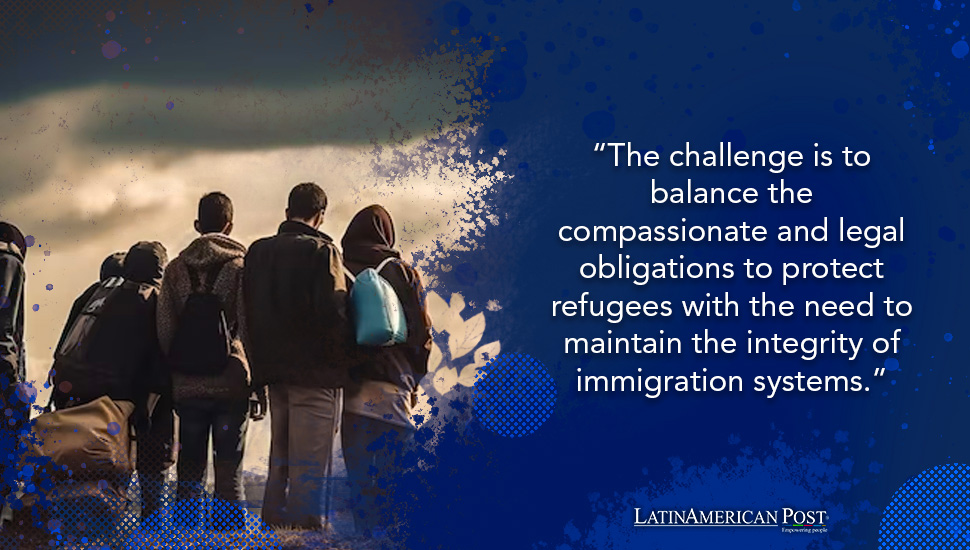Exploiting Asylum Claims as Economic Migrants from Colombia and Peru Masquerade as Refugees

While Venezuela’s humanitarian crisis justifies asylum claims, the surge from countries like Colombia and Peru raises questions about the misuse of refugee systems to bypass standard immigration processes.
Unprecedented Rise in Asylum Applications
In recent years, the international community has witnessed an unprecedented rise in asylum applications, a trend that has been particularly notable in Spain. According to a report by the Spanish Commission for Refugee Aid (CEAR), Venezuela, Colombia, and Peru accounted for almost 79 percent of asylum seekers in Spain in 2023. This surge reflects a broader narrative of migration and asylum-seeking that merits a closer examination, especially when considering the legitimacy of claims beyond the clear-cut crisis in Venezuela.
Venezuela’s situation stands out starkly against this backdrop. The country’s descent into political, economic, and social turmoil under the Maduro regime has triggered a mass exodus, with over 60,534 Venezuelans seeking refuge in Spain last year alone. The dire conditions in Venezuela, characterized by widespread poverty, violence, and oppression, undeniably warrant the international protection provided to its citizens. This is evidenced by the Spanish government’s relatively high acceptance rate of Venezuelan asylum seekers on humanitarian grounds.
However, the narrative becomes more complex when considering Colombia and Peru, which followed Venezuela with 53,564 and 14,308 applications, respectively. Unlike Venezuela, these nations have not experienced the same acute national crisis that typically justifies a mass exodus on humanitarian grounds. Colombia, despite its peace agreement signed in 2016 to end decades of conflict, still grapples with violence in certain areas. However, the country has made significant strides towards stability and economic growth, raising questions about the 94 percent rejection rate of its asylum seekers in Spain. This high rate of denial suggests that many applicants from Colombia might be leveraging asylum claims to circumvent standard immigration processes rather than fleeing from persecution or immediate threat.
Peru’s Challenge: Economic Migration vs. Asylum-Seeking
Similarly, while significant, Peru’s political and social challenges do not compare to the humanitarian disaster in Venezuela. Yet, Peruvians represented a substantial portion of asylum applications in Spain, with a majority being denied. This pattern indicates a possible misunderstanding or misuse of the asylum system, where economic migration is being conflated with asylum-seeking. Asylum systems are designed to protect individuals from persecution based on race, religion, nationality, membership in a particular social group, or political opinion, not to facilitate economic migration.
The distinction between economic migrants and refugees is crucial in this context. Economic migrants move primarily to improve their lives by finding work, whereas refugees are forced to flee to save their lives or preserve their freedom. While empathy for all migrants is essential, blurring these lines undermines the integrity of asylum systems and detracts from the urgency of genuine refugee crises, such as that in Venezuela.
Moreover, the situation in Honduras, El Salvador, and Nicaragua, where violence from criminal organizations and political unrest have led to increased asylum recognition rates, underscores the need for a nuanced approach to asylum policies. Unlike Colombia and Peru, these countries demonstrate clear links between the threats their citizens face and the criteria for international protection.
The surge in asylum applications has placed immense pressure on Spain’s asylum system, leading to backlog and delays. In 2023, Spain received 163,218 protection applications, a record high that has strained the capacity to review and process claims adequately. This overload risks compromising the ability to provide timely protection to those in genuine need, further exacerbating the plight of actual refugees.
Balancing Compassion and Legal Obligations
The challenge, then, is to balance the compassionate and legal obligations to protect refugees with the need to maintain the integrity of immigration systems. Countries like Spain must navigate this delicate balance, ensuring that those in genuine need receive protection while safeguarding against the system’s misuse. This requires a multifaceted approach, including improving the efficiency of asylum processing, enhancing cooperation with countries of origin to address root causes of migration, and distinguishing between economic migrants and refugees in policy and practice.
Also read: Taylor Swift at the Super Bowl is Catalyzing a New Era of NFL Fandom in Latin America
While Venezuela’s humanitarian crisis indisputably necessitates asylum, the increased applications from countries like Colombia and Peru invite a critical examination of current asylum practices. It is imperative to uphold the sanctity of asylum to ensure it remains a lifeline for those facing genuine persecution rather than a shortcut for standard immigration processes. As the world grapples with growing migration challenges, the international community must work collaboratively to uphold the protection principles for refugees while ensuring the sustainability and fairness of the asylum system.





